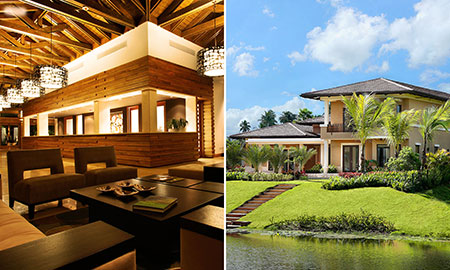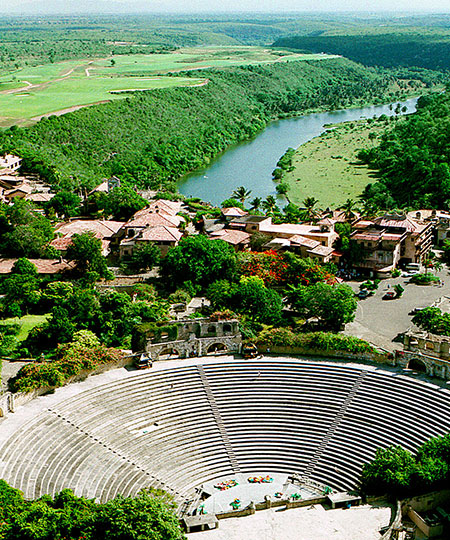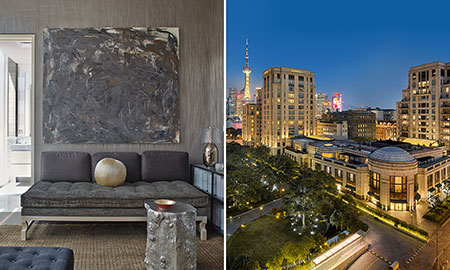A Hotel to Call Home
by Natasha Wolff | September 26, 2014 11:08 am
For a certain kind of traveler, the best part of vacationing isn’t lounging on the beach, lingering over dinner or spending hours in the spa—it’s the luxury of being looked after in five-star fashion. So it’s no surprise that an increasing number of jet-setters are opting to take up residency at their favorite fancy properties. “We’re definitely seeing a rise in the number of luxury branded residences on offer, and we’ve also seen a rise in demand from buyers,” says Charles Weston Baker, head of international residential at the global real estate firm Savills. In New York, the Baccarat Hotel[1] began selling its residences in March 2013, while the building was under construction. Within six months, half of the 59 units had been purchased sight unseen, for prices starting at $3.95 million.

- Casa De Campo Resort, Dominican Republic, and St. Regis Baha Beach, Puerto Rico
The concept itself isn’t new—people have been turning hotels into extended-stay homes for decades—but now, a slew of high-profile properties are making the idea of hotel living more enticing than ever. At the St. Regis Bahia Beach Resort[2] in Puerto Rico, prospective homeowners have the option of purchasing a two- or three-bedroom oceanfront condo or building a house of their own on one of six available lots. Either way, they’ll be afforded access to the St. Regis’ signature butler service, in-residence spa treatments and personal chefs. Elsewhere in the Caribbean, the Dominican Republic’s Casa de Campo Resort [3]has a fleet of helicopters at the ready for villa owners, plus an international airport and private jet terminal on the premises. And because convenience is key, most residents carry a courtesy card to use in lieu of a credit card (or cash) around the property—from the Equestrian Center to the spa.

- Casa de Campo Resort, Dominican Republic
Aside from the perks, there’s also an interesting value proposition for prospective buyers. Amanzoe[4], a lavish Aman resort on Greece’s Peloponnesian coast, has seen prices of its on-property villas double since they came to the market in 2013. They’re now going for $9.5 million. The reason, says one expert, has a lot to do with being attached to a name. “People recognize the value of an established brand. It gives them a degree of comfort and familiarity,” explains James Price, a partner at international real estate consultancy firm Knight Frank. There is, of course, a premium involved—typically a mark-up of 20 to 30 percent—but owners tend to see an equivalent premium on rentals and resales. Says Weston Baker, “Buyers feel confident that their purchase will hold its value, and they know exactly what levels of service they can expect to enjoy.”
Another major selling point, adds Price, is what happens when owners aren’t there. “You have the security of knowing that the building is being maintained and looked after. Of course, you can still have that by hiring your own management team, a permanent resident guardian, someone to make sure the pool is cleaned—but it’s costly, and ultimately, you’re forced to pay closer attention,” he says.

- Baccarat Hotel, New York, and Peninsula Shanghai, China
The hassle-free lifestyle is particularly desirable in cities, where branded high-rises offer all the amenities of a luxury apartment building, and then some. At The Peninsula Shanghai[5], owners of the hotel’s 39 riverside apartments have access to chauffeured Rolls Royce Phantoms, a refrigerator restocking service, dog walkers and more.
“The idea of five-star service is that if it’s legal, we can make it happen,” says Larry Kruysman, the senior sales director of New York’s Baccarat Hotel & Residences. Set to open later this year, the property recently listed its five-bedroom penthouse for $60 million, which, some might say, is a small price to pay for permanent pampering.
MORE:
The Insider’s Guide to Luxury Travel[6]
Cabin Fever: Posh Pods to Enjoy the Great Outdoors
The 7 Deadly Hotel Sins[7]
- Baccarat Hotel: http://www.baccarathotels.com/
- St. Regis Bahia Beach Resort: http://www.stregisbahiabeach.com/
- Casa de Campo Resort : http://casadecampo.com.do/
- Amanzoe: http://www.amanresorts.com/amanzoe/home.aspx
- The Peninsula Shanghai: http://shanghai.peninsula.com/en/default
- The Insider’s Guide to Luxury Travel: http://dujour.com/article/insider-travel-tips-carry-on-essentials
- The 7 Deadly Hotel Sins: http://dujour.com/article/travel-hotel-etiquette-manners-2014
Source URL: https://dujour.com/life/buying-resort-hotel-properties/

